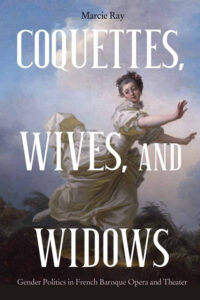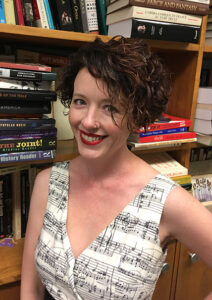
Marcie Ray’s study of French Baroque opera shows how the storylines within those works resonate in the 21st century.
While 18th century French Baroque opera may seem passé, a Michigan State University musicologist is showing how the storylines within those works resonate in the 21st century.
“The Bachelor shows us who is marriageable and who isn’t,” she said. “The series loves to demonize women who they say are loud, aggressive or emotional. French opera did that too, through denigrating portraits of independent women.”
The path to gender politics

Michigan State University College of Music Associate Professor of Musicology Marcie Ray spent 10 years as a coloratura soprano, specializing in Mozart and Menotti roles. She now translates her training and experience into her work as a music historian.
Ray came to the study of musicology after studying and performing professional opera. While she loved opera, she admitted she wasn’t suited for the performing life. Musicology combined everything she loved: music, history, languages and reading. Plus, she could recommence her study of opera.
Ray started laying out research and book ideas as a master’s and Ph.D. fellow at the University of California-Los Angeles. In 2009, she began teaching musicology at MSU, focused on examining the intersection of music with multiple issues including gender, sexuality, class, race, ethnicity, religion and disability. She continued to formulate ideas for a book, but struggled with the angle. In need of editorial guidance, she turned to her faculty mentor, Michael Largey, MSU professor of musicology and renowned author and ethnomusicologist.
“Michael sensed exactly what I wanted to do,” said Ray. “Once I discovered what I really wanted my book to be about, my writing started to come from a more authentic place.”
Ray said one of her key goals was to author a book on gender roles and music that was accessible to a broad audience. She didn’t want her book to be stuck in a narrow portion of the musicology field, but rather be for anyone interested in gaining a cultural context for understanding women and their lives.
Largey concurred that Ray’s careful analysis of French Baroque opera through the lens of gender shows that women’s roles—both as musical subjects and creative artists—continue to define and constrain women.
“Dr. Ray’s work is an excellent example of scholarship that promotes diversity, equity, inclusion and belonging though a musical practice that has historically been ignored or devalued by historians,” he said. “She shares her expertise with students and guides them in their own writing to explore important social and political issues that are so critical for fully understanding today’s world.”
For more information and to purchase Coquettes, Wives and Widows: Gender Politics in French Baroque Opera and Theater is available for individual purchase from the publisher.



